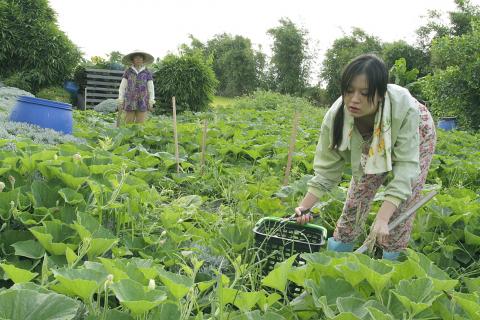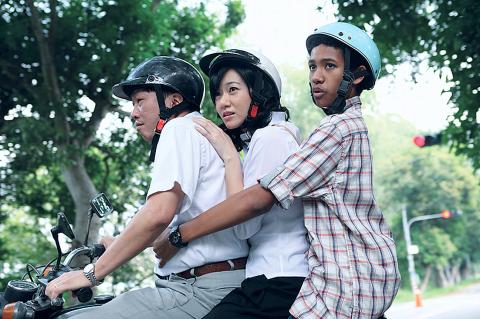A ccording to statistics compiled by the Ministry of the Interior (內政部), the number of married immigrants in Taiwan exceeded 450,000 last year. Yet despite their increasing presence, these foreign spouses, most of whom come from China, Vietnam and Indonesia, remain largely invisible in mainstream Taiwanese society and the mass media.
Four films currently showing at the SPOT — Taipei Film House (光點台北), under the appellation of We Are Family: Festival of the New Immigrants (內人/外人新移民系列電影), shed light on these newcomers.
The idea to make films about immigrants first came to film producer Khan Lee (李崗) five years ago. With funding and support from the National Immigration Agency (移民署) and Videoland Inc (緯來電視網), the project evolved into four feature-length movies by four Taiwanese directors.

Photo courtesy of Zeus International Production
In My Little Honey Moon (野蓮香), director Cheng Yu-chieh (鄭有傑) explores his interest in the themes of migration and diaspora, which he first addressed in his debut feature Do Over (一年之初, 2006). The film tells the tale of a family drama centering on Joan, played by Vietnamese actress Helen Thanh Dao, a woman who made her home in the Hakka town of Meinong (美濃) in Greater Kaohsiung.
Joan has dedicated herself to her husband’s family for the six years since she moved to Taiwan. She masters Hakka and Mandarin, yet her husband can’t speak a word of Vietnamese, and her mother-in-law, with her occasional racist comments, has never made Joan feel part of the family. The Vietnamese wife and mother soon develops a friendship with her reticent daughter’s teacher Sun, played by songstress and actor Yangui Yasiungu of Tsou tribe (鄒族), who, as a person of Aboriginal descent, understands too well what it feels like to be an outsider.
Sticking to straight-forward storytelling, the film is less striking than the director’s previous works, but its approach to its characters, especially the husband, played by theater actor Chen Zhu-sheng (陳竹昇), whose ego is wounded and pride suffers because he can barely support his family with his organic farming business, is sincere.

Photo courtesy of Zeus International Production
In The Golden Child (金孫), seasoned female director Chou She-wei (周旭薇) adopts a blackly comic and slightly absurd tone in portraying Vietnamese woman Jinzhi’s (Esther Liu, 劉品言) struggle to fulfill the traditional role of female in a Hoklo village in Taichung. One of the many eloquent moments in the film that challenge conventional ideas of family involves Jinzhi’s sister’s half-black and half-Vietnamese baby boy, who Jinzhi eventually raises as her own, frolicking in front of the portraits of the husband’s ancestors.
Technically polished and emotionally absorbing, The Happy Life of Debbie (黛比的幸福生活) tells the bitter-sweet tale of Debbie (Jade Chou, 周幼婷) from Indonesia, who works as a coffee bean picker in Gukeng Township (古坑), Yunlin County, to support her unemployed husband Lu (Chao Cheng-ping, 趙正平) and her teenage son Han, played by first-time actor Nur Najman Ade Putra. Their life is interrupted when a suited Indonesian man shows up at the door, threatening to lay bare the family’s long-held secret.
In the film, her second feature, director Fu Tien-yu (傅天余) demonstrates she possesses surprisingly mature storytelling skills. The movie opens with a nearly 10-minute scene that neatly shows Fu’s talents: Debbie wakes up from dream about her lush hometown. It takes her a second to realize she is now in a place far away from home. On her way to deliver coffee beans, she receives two phone calls. In the first, she is told that her drunken husband is in trouble again at work; in the other she is asked to pick up her son, who has been bullied at school. Debbie stops at a crossroads, not knowing which way to go.

Photo courtesy of Zeus International Production
Meanwhile, award-winning television director Chen Hui-ling’s (陳慧翎) The Moonlight in Jilin (吉林的月光) tells a rather uneven tale about the plight of Chinese woman Weiwei (Yin Shin, 尹馨), who comes all the way to subtropical Taiwan from her snow-capped hometown of Jilin only to find the man she has married is a criminal on the run.
The series runs until May 25 at SPOT — Taipei Film House (光點台北), 18, Zhongshan N Rd Sec 2, Taipei City (台北市中山北路二段18號). All films have English subtitles. A screening schedule can be found at www.spot.org.tw.

Photo courtesy of Zeus International Production

April 14 to April 20 In March 1947, Sising Katadrepan urged the government to drop the “high mountain people” (高山族) designation for Indigenous Taiwanese and refer to them as “Taiwan people” (台灣族). He considered the term derogatory, arguing that it made them sound like animals. The Taiwan Provincial Government agreed to stop using the term, stating that Indigenous Taiwanese suffered all sorts of discrimination and oppression under the Japanese and were forced to live in the mountains as outsiders to society. Now, under the new regime, they would be seen as equals, thus they should be henceforth

Last week, the the National Immigration Agency (NIA) told the legislature that more than 10,000 naturalized Taiwanese citizens from the People’s Republic of China (PRC) risked having their citizenship revoked if they failed to provide proof that they had renounced their Chinese household registration within the next three months. Renunciation is required under the Act Governing Relations Between the People of the Taiwan Area and the Mainland Area (臺灣地區與大陸地區人民關係條例), as amended in 2004, though it was only a legal requirement after 2000. Prior to that, it had been only an administrative requirement since the Nationality Act (國籍法) was established in

With over 80 works on display, this is Louise Bourgeois’ first solo show in Taiwan. Visitors are invited to traverse her world of love and hate, vengeance and acceptance, trauma and reconciliation. Dominating the entrance, the nine-foot-tall Crouching Spider (2003) greets visitors. The creature looms behind the glass facade, symbolic protector and gatekeeper to the intimate journey ahead. Bourgeois, best known for her giant spider sculptures, is one of the most influential artist of the twentieth century. Blending vulnerability and defiance through themes of sexuality, trauma and identity, her work reshaped the landscape of contemporary art with fearless honesty. “People are influenced by

The remains of this Japanese-era trail designed to protect the camphor industry make for a scenic day-hike, a fascinating overnight hike or a challenging multi-day adventure Maolin District (茂林) in Kaohsiung is well known for beautiful roadside scenery, waterfalls, the annual butterfly migration and indigenous culture. A lesser known but worthwhile destination here lies along the very top of the valley: the Liugui Security Path (六龜警備道). This relic of the Japanese era once isolated the Maolin valley from the outside world but now serves to draw tourists in. The path originally ran for about 50km, but not all of this trail is still easily walkable. The nicest section for a simple day hike is the heavily trafficked southern section above Maolin and Wanshan (萬山) villages. Remains of